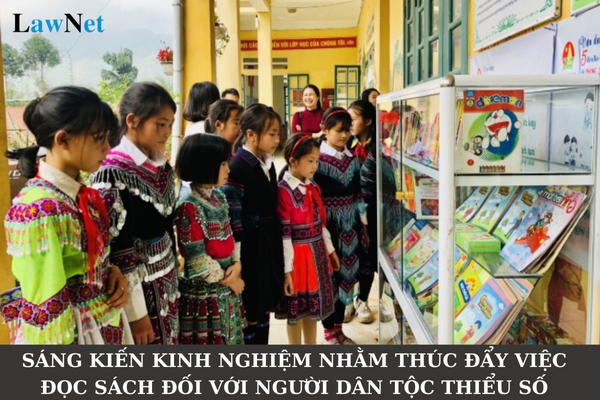What is the sample initiative aimed at promoting reading among ethnic minorities in Vietnam?
What is the sample initiative aimed at promoting reading among ethnic minorities in Vietnam?
The Reading Culture Ambassador Contest 024 for upper secondary school students and university students includes the following request:
Write an initiative to promote reading among the following teams: residents in border areas, islands; areas with socio-economic difficulties; ethnic minorities, the elderly, and those with literacy disabilities… (Identify objectives, beneficiaries, content of implementation tasks, and projected results. Encourage initiatives that have been applied in practice and have evidence).
Below is a sample initiative aimed at promoting reading among ethnic minorities in Vietnam as follows:
|
Initiative aimed at promoting reading among ethnic minorities in Vietnam I. Objectives |
Note: The content is for reference only.

What is the sample initiative aimed at promoting reading among ethnic minorities in Vietnam? (Image from the Internet)
What are the principles for selecting textbooks used in general education institutions in Vietnam?
Pursuant to Article 2 of Circular 27/2023/TT-BGDDT, the principles for selecting textbooks used in general education institutions in Vietnam are as follows:
- Textbooks shall be selected from the list approved by the Minister of Education and Training for stable use in educational institutions.
- Each grade selects one (01) textbook for each subject or educational activity (including elective topics if any) to be implemented in educational institutions (hereafter referred to as subjects).
- The selection of textbooks must ensure democratic, objective, public, and transparent processes for the benefit of students.
What is the process for selecting textbooks used in general education institutions in Vietnam?
According to Article 7 of Circular 27/2023/TT-BGDDT, the process for selecting textbooks used in general education institutions in Vietnam is as follows:
(1) The council develops a plan to organize the textbook selection and assign tasks to the council members.
(2) Organize textbook selection within professional teams
- Based on the council's plan and textbook selection criteria, the head of the professional team develops a plan to organize textbook selection for each subject included in the team's structure and reports to the head before implementation.
- Organize participation of all subject teachers (including full-time, contractual, seconded, and visiting teachers, and inter-school teachers) in selecting textbooks for the subject.
- No later than 20 days before the first meeting of the professional team, the head organizes for subject teachers to review textbooks, write evaluation forms, and assess textbooks based on selection criteria.
- The head of the professional team holds meetings with subject teachers to discuss and vote on selecting one (01) textbook for the subject. If only one textbook is approved by the Minister of Education and Training, the team selects that textbook without voting.
+ The selected textbook must be chosen by at least 1/2 (half) of the subject teachers. If no textbook receives 1/2 (half) of the votes, the team discusses and votes again; the chosen textbook in the second round is the one with the highest number of votes. If there are two textbooks with equal highest votes in both rounds, the head of the professional team decides on one.
+ Meetings must be officially recorded, including comments and evaluations of textbooks by participating teachers, with signatures from the head of the team and the recorder.
- The head of the professional team summarizes results and compiles a list of textbooks selected with the signatures of the head and the assigned compiler.
(3) The council meets to discuss, and evaluate the organization of textbook selection by various teams; reviews meeting records; and teacher evaluations; compiles a selection result document (including selection organization review and team's chosen textbooks), signed by the Chairman and the Secretary.
(4) The council proposes to the head a list of textbooks selected by professional teams.
(5) Educational institutions prepare a textbook selection dossier for submission to the Department of Education and Training (for primary and lower secondary levels) or the Department of Education and Training (for upper secondary level). The dossier includes:
- Decision establishing the council;
- Minutes of council meetings;
- List of textbooks selected by the institution.

